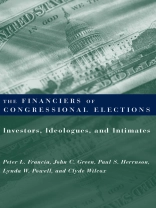Individual donors play a critical role in financing congressional elections, accounting for more than half of all money raised in House campaigns. But significant donors (defined here as those contributing more than $200) are the least understood participants in the system. Defenders assert that contributing money to campaigns is part of a broader pattern of civic involvement and is free speech that gives a voice to various interests. Detractors argue that these contributions are undemocratic, enabling wealthy citizens to overwhelm the voices of the many and to promote narrow business and policy interests. These divergent assessments were raised in connection with the Bipartisan Campaign Finance Reform Act of 2002 and continue to characterize the debate over campaign finance reform.
So who really contributes and why? How much and to how many candidates? What are the strategies used by political campaigns to elicit contributions and how do the views of significant donors impact the campaign-finance system? What do donors think about campaign-finance reform? This book investigates these vital questions, describing the influence of congressional financiers in American politics.
Inhaltsverzeichnis
Preface
1. Introduction
2. Who Are the Financiers of Congressional Elections?
3. What Motivates Donors?
4. Candidates, Donors, and Fundraising Techniques
5. The Contribution
6. The Donors Contact Congress
7. Congressional Donors and Campaign Reform
8. Conclusion
Appendix
Index
Über den Autor
Peter L. Francia is a research fellow and program coordinator at the Center for American Politics and Citizenship at the University of Maryland. He is the author of the forthcoming book,
The Future of Organized Lbor in American Politics. John C. Green is Distinguished Professor of Political Science and director of the Ray C. Bliss Institute of Applied Politics at the University of Akron. He is the editor of
Financing the 1996 Election, and coeditor of
The State of the Parties. Paul S. Herrnson is director of the Center for American Politics and Citizenship and professor of government and politics at the University of Maryland. He s the author of
Congressional Elections: Campaigning at Home and in Washington. Lynda W. Powell is a professor of political science at the University of Rochester and coauthor of
Serious Money: Fundraising and Contributing in Presidential Nomination Campaigns.. Clyde Wilcox is a professor of government at Georgetown University. He is the author of numerous books and articles on campaign finance, religion and politics, and gender politics.












